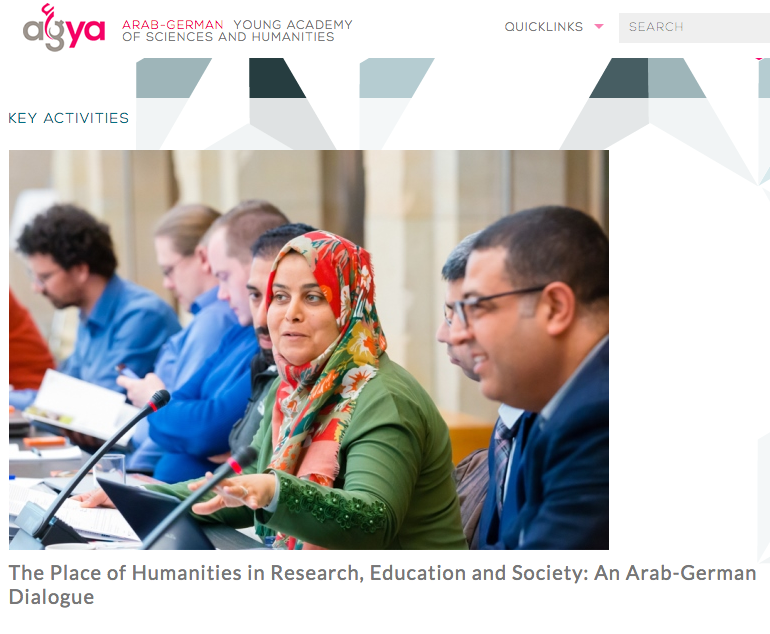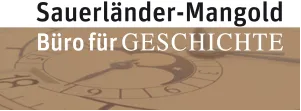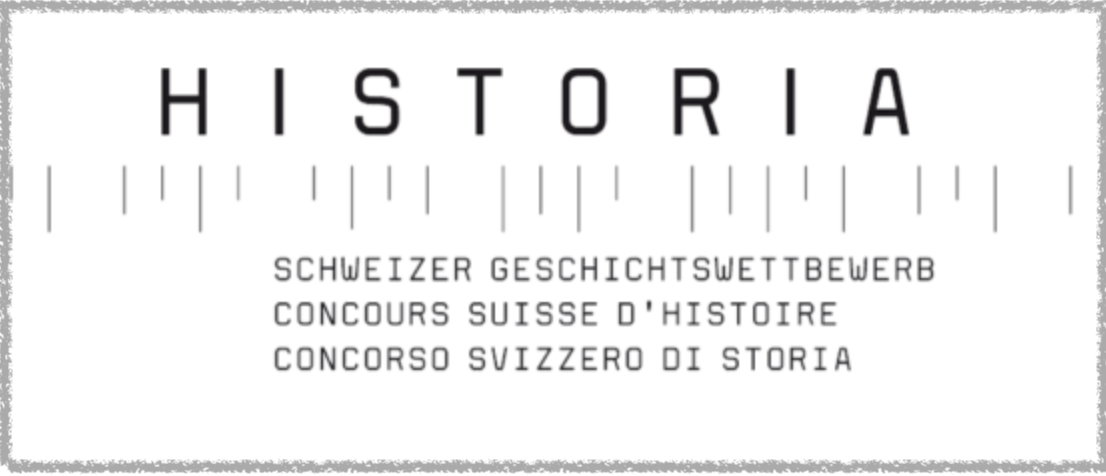 Next weekend in Berlin, Freie Universität:
Next weekend in Berlin, Freie Universität:
The Place of Humanities in Research, Education and Society: An Arab-German Dialogue
A conference organized by the Arab-German Young Academy of Sciences and Humanities.
Teaching Humanities at Secondary Schools
The program is uploaded, the registration is free. Come and join us for exchange and discussion.
I’m glad to chair the workshop on school education, Saturday, 11:30-13:30 (see the PDF on the website).
Our panel includes 6 speakers, 3 from Arab countries, 3 from Germany.
Inhalt
The panel announcement
This panel brings together education experts from Egypt, Lebanon and Germany. Together we want to apply the basic questions of the conference to a particularly important area, that is, the education of young people. Experts from the fields of educational sciences, historical and political education, museum pedagogy and literature didactics will discuss these issues. All these fields are united by the common horizon of the humanities. The exchange of experience is to be structured by three guiding aspects in all presentations:
1) How do you assess the status and future of the humanities and humanistic ideas in your respective professional area of your nation or culture?
2.) What do you see as a possible contribution of your respective professional area to humanistic education?
3.) From the perspective of your nation and cultural background, what do you see as the humanistic learning potential of intercultural learning, in this case especially the topic of Arab-European and Arab-German cultural contacts? Could you illustrate this by way of example?
The presentations should not last longer than 20 minutes each and will be held in English.
The participants
I’m happy that I could interest my busy colleagues for this upcoming opportunity for Arab-German exchange:
Shaimaa Atef (Kairo)
Bassel Akar (Beirut)
Nariman Moustafa (Kairo)
Irene Pieper (Hildesheim)
Susanne Popp (Augsburg)
Inken Heldt (Kaiserslautern)
General information
This is the way to the official website: http://www.agya.info/humanities-conference2019/
Room L 115
Time: Saturday, November 9, 11:30-13:30
The abstracts of our presentations
Bassel Akar (Beirut)
History and citizenship education for learning to live together: Transforming classroom learning and teaching in conflict-affected areas
In democratic societies, the aims of humanities curricular programs like history and citizenship education include empowering young people to critically engage in activities and discourses that address social injustices and enhance how they live in diversity. However, contexts emerging out of conflict adopt a “do no harm” approach to learning history and citizenship. The knowledge fields of two subjects inherently comprise conflicting narratives, controversial issues and sensitive topics. Avoiding conflict in the classroom results in learning pre-determined knowledge that compromises opportunities to think critically, engage in dialogues, collaborate and manage conflict. Recent studies have identified and reported on a profile of high-impact teachers who are experimenting with new approaches to teach the national history and citizenship curriculum. Their experiences suggest innovative activities that teachers and students from different cultures can develop critical pedagogies in history and citizenship education that empower children to capitalize on and celebrate diversity.
Shaimaa Atef (Kairo)
Museum Education as a tool towards cultural inclusion
This presentation will provide an introductory brief on the role of museums towards the societies that they are representing and conducting their excavations and researches in. Despite that museums are easily categorized as institutions that guard history and have no connections with their present society, they actually are important actors fostering cultural inclusion. And here comes the role of museum education programs and activities, which are the main sphere of interaction among museums and society. Museum Education was mainly developed to interpret the museum collections and narratives, but also it provides a space for discovery, observation, critical thinking, dialogue, debate and self-reflection.
Also, the presentation will show an example of a heritage education program that was carried out in Shutb Village that is a small agricultural town 5km south of Asyut in Middle Egypt. This program was in cooperation with the British Museum’s Asyut Region Project that aims at studying the broad spectrum of the village’s history – from 2500 BC up until the present day. The education program mainly worked with School students in the village on how they regard their village history and its current position through a group of self-selected day-to-day activities and tours in the village. The activities were mainly a mix of storytelling, drawings, readings, and experiencing the local crafts of the village.
Inken Heldt (Kaiserslautern)
Civic education as a key to advancing societies
What are the most challenging issues in the humanities today? Citizenship education in Germany indisputably has a key role to play in advancing society’s political discourse on anti-democratic tendencies and pluralism in Germany, and in contributing to a more integrated society in terms of minorities and social classes. Other current areas singled out for advancement include the topics of including hard-to-reach-learners, gender mainstreaming, and economic education as a requisite for citizenship education. Rather than take the foundations of a democratic order for granted, citizenship education must convey and deliberate over these notions again and again, and simultaneously encourage active democratic citizenship.
Concerning research needs, the major challenge for citizenship education in Germany at present is to build further upon the international discourse and research base that already does exist.
Nariman Moustafa (Kairo)
The humanities on the fringes: living and embodying the humanities rather than teaching it in alternative spaces in Egypt
Irene Pieper (Hildesheim)
No longer a national view: Potentials of literature education for cultural and intercultural learning
Literature has traditionally been a central part of L1-education (first or standard language education as different from foreign language education; historically called ‘mothertongue’) since the late 19th century in German speaking countries. This remains true even though aims of the subject with regard to literacies have become much stronger since 2000 (PISA), particularly with regard to reading literacy. Formal curricula for primary, lower and upper secondary pay considerable attention to literature as a central medium for supporting personal growth, social awareness and cultural and intercultural literacy. Learning about oneself and others, learning about culture and cultures also with regard to cultural memory are central aims. With regard to the role of literature within the L1-curriculum of secondary education it should be noted that in practice it is stronger with the higher academic track, while the lower academic track assigns less space for learning with literature.
Attention for the potential of literature in a frame of intercultural education has risen in recent years, not the least because of a growing awareness for the cultural multitude of our society. Historically, literature education was connected to the notion of a national canon. However, this notion has been questioned strongly particularly since the 1960s. Nowadays, the notion of literature is much broader and the potential of literature for encouraging perspective-taking and enhancing historical and cultural understanding is much more appreciated: Encounters with literature offer not only aesthetic experiences with language, involving imagination, emotions, the whole person. They also allow for learning about the worlds of others in a specific way, since the engagement with characters and their lives and surroundings is particularly strong and closer to experience than a more information-based approach to culture/s. Though in the discourse around literature education a mere focus on theme and content is considered as too narrow (given the risk of missing out on the specifics of aesthetic discourse) of course the question matters how literature is situated culturally and socially and how it helps cultural understanding.
Two areas in my perception are stimulating in the context of the workshop:
- With regard to literature, one area concerns possibilities to cross borders towards cultural traditions of the Arab worlds that found their way into European literature and its canon. Thus, an intercultural reading of ‘1001 nights’ can be stimulating, also the fascination of German authors by what used to be called the Orient (Goethe, Lasker-Schüler and others).
- With regard to learners, of course intercultural literature education is also concerned with addressing cultural diversity in the classroom. Thus, texts that reflect intercultural biographies and linguistic cross-overs can be very stimulating for the classroom and the so-called migration literature is finding its way into school. Also, multilingual picture books are designed for primary education. – A challenge and potential concerns the contribution of literature education to cultural memory with regard to the German history: Literature is an important medium for encounters with the German-Jewish history, Fascism and the Shoah.
Susanne Popp (Augsburg)
The present state of Humanities in German school curricula from the perspective of History Didactics
The contribution firstly deal with the current status of Humanities in the curriculum of German (high) schools. Secondly, it explores the role of the school subject of history and of history teacher education at universities. Finally, the didactic potentiality of history education in fostering intercultural competences – with a focus on Arab-German relations – will be discussed.





